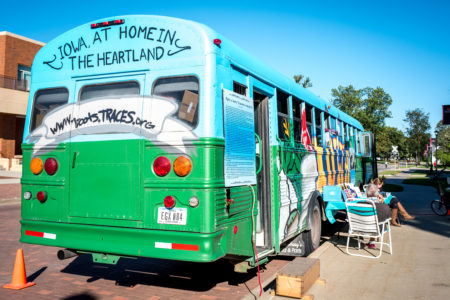
If you’ve seen what looks like a school bus, but with the word Iowa along with an illustration of the Iowan landscape painted on it, you’ve seen the Bus-eum exhibit called “A Home in the Heartland: Forgotten Stories of how Iowa Got to Be ‘Us.’” Grinnell alum Amy Clampitt, renowned poet, in fact, worked for one of places featured in the exhibit. TRACES is an organization that drives bus exhibits about Iowa’s social history around the Midwest.
TRACES’ vision is to “[bring] people of different backgrounds and perspectives together to speak with each other, respectfully and expectantly, in order to exchange experiences and opinions. We tap the past for clues about what to avoid repeating in the future, as well as what worked well in the past that might serve us well now as we seek a better way forward towards a more peaceable world,” according to the organization’s website.
“A Home in the Heartland” is the organization’s fifth exhibit, according to Michael Luick-Thrams, director of TRACES. Over a third of a million people have been on the bus, learning about the history of Iowa — the first four exhibits focused on Iowa during World War II. The bus can fit a class of 25 students and a teacher, so people whose stories TRACES preserves have been able to speak to classes, creating an even more personal narrative than what is acquired from the exhibit itself.
“The reason we’re shifting from Midwest World War II stories is because most of those people that used to come to our bus are now dead,” Luick-Thrams said. “We’ve had former refugees, we’ve had internees, POWs, other people.”
“A Home in the Heartland” follows Iowa’s social history from the very beginning when Albert Lea and other pioneers “sought to build a new Canaan on the prairie,” to Iowa’s more modern history including a commitment to education and changing roles of Iowan families.
Situated around the bus are posters, describing different themes and time periods. In the back of the bus, there is a video and speaker space. Three videos play during this exhibit. One of the videos recounts the story of Scattergood Hostel, a refugee camp for European Jews who were able to make it to Iowa.
Scattergood was a Quaker hostel in West Branch, Iowa. The video described it as looking more like a family farm than a refugee camp. Quakers and Jews worked the fields and did chores side by side, the Quakers acting as supportive resources for those who narrowly escaped Hitler’s concentration camps.
Not only were the staff at Scattergood willing to listen to stories and be compassionate, but Scattergood also provided healthcare, language classes and job trainings to the 163 European Jews who were helped at the hostel.
“[They] wanted these tattered and tired people to know they deserved respect,” the video said. “[It was a] place where people could regather themselves.”
One of the Scattergood Hostel staff members was Grinnell’s own Amy Clampitt, according to Luick-Thrams. In addition, some professors who weren’t able to continue doing work at Scattergood came to Grinnell instead.
“A Home in the Heartland” features many more examples like Scattergood. TRACES has taken the bus to many different locations, including “Nebraska cow towns, Northern Minnesota logging camps [and] inner-city Chicago schools,” in order to share Iowa’s history that they have compiled over the years.
“It’s been preservation and populization. We want to make history accessible, and we want to make it personal,” Luick-Thrams said. “When you read history, it’s distance. But when you hear [narratives like] ‘I was scared for my life as the Nazis came looking for all the Jews in our village,’ then you experience it differently. We want to bring the history to life — make it personal rather than abstract.”




























































